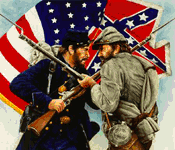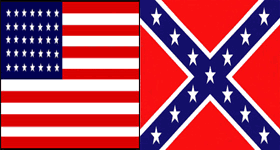 |
Civil War Battles |
|
State War Records |
| AL - AK - AZ - AR - CA - CO - CT - DE - FL - GA - HI - ID - IL - IN - IA - KS - KY - LA - MA - MD - ME - MI - MN - MS - MO - MT - NE - NV - NH - NJ - NM - NY - NC - ND - OH - OK - OR - PA - RI - SC - SD - TN - TX - UT - VT - VA - WA - WV - WI - WY |
Hampton Roads Peace Conference
February 4, 1865 in Hampton Roads, Virginia

The story begins in early January of 1865 which was before Sherman left Savannah on his march through the Carolinas. Mr. Francis P. Blair, Sr., instigated the conference by obtaining President Lincoln’s permission to contact Confederate President, Jefferson Davis, concerning a possible temporary halt in the war. Mr. Blair was closely connected to the Lincoln administration and he was concerned about the efforts on the part of the French to establish a military presence in Mexico in order to help them reconquer the territory that had been lost in the war with America. Mr. Blair made his proposal to President Jefferson Davis that a secret military conference take place and that all hostility cease between the North and South for the purpose of letting the American army enforce the Monroe Doctrine by directing all of its efforts to evicting the French from Mexico, thereby stopping any assault by the Mexicans on the southwest corner of America.
President Lincoln gave his permission to Mr. Blair to talk with Jefferson Davis but indicated to him that he did not endorse Mr. Blair’s ideas; however, he would not stand in the way of some military conference to discuss peace terms and to stop hostilities while the conference was in session. Jefferson Davis listened to Mr. Blair’s proposal, met with his cabinet and it was decided that three delegates were to be appointed to meet with President Lincoln and his Secretary of State, William Seward. The three Confederate delegates were Mr. Stephens, John Campbell, a former U.S. Supreme Court Justice from Alabama, and a Mr. R. M. T. Hunter, a member of the Confederate Senate. The Confederate delegates were given safe passage through Northern lines and met directly with General Grant, who put them on a boat to go to Fortress Monroe. When they reached Fortress Monroe near Hampton Roads, Virginia, they were then escorted to another steamer where President Lincoln and Mr. Seward were to meet with them. The actual meeting occurred on February 3, 1865.
Mr. Seward indicated that this was to be an informal conference with no writing or record to be made, all was to be verbal, and the Confederates agreed. President Lincoln announced in the beginning that the trip of Mr. Blair was approved by him but that he did not endorse the idea to halt the hostilities for the purpose of the American army going to Mexico to enforce the Monroe Doctrine; however, he had no objection to discussing a peace offer at this time. President Lincoln stated that he had always been willing to discuss a peace offer as long as the first condition was met and that would be for the Confederacy to pledge to rejoin the Union. If that condition was agreed upon then they could discuss any other details that were necessary. Mr. Stephens responded by suggesting that if they could come up with some proposal to stop the hostilities, which might lead to the restoration of the Union without further bloodshed, would it not be advisable to act on that proposal, even without an absolute pledge of ultimate restoration being required at the beginning? President Lincoln replied firmly that there would be no stopping of the military operations unless there was a pledge first by the Confederacy to rejoin the Union immediately.
Judge Campbell then asked what would be the terms offered to the South if they were to pledge to rejoin the Union and how would they be taken back into the Union. Since there was no immediate response by either President Lincoln or Mr. Seward, Vice-President Stephens stated that it would be worthwhile to pursue stopping the hostilities to have a cooling off period so that the peace terms might be investigated without the passions of the war. Mr. Stephens indicated that should the hostilities stop for some extended period of time, he felt that there would be a good chance that many of the states would rejoin the Union on the same terms as they had when they joined in the beginning, but that the sovereignty of the states would have to be recognized upon rejoining the Union. Mr. Seward objected that a system of government founded upon the right of secession would not last and that self-preservation of the Union was a first law of nature which applies to nations as well as to individuals. He brought up the point that if all the states were free to secede, they might make a treaty with some foreign nation and thus expose the Union to foreign aggression. Mr. Stephens responded that the principle of self-preservation also applied to every state by itself and it would never be in the interest of any single state or several states to join with some foreign power against those states which remained in the Union.
Mr. Hunter then brought up the question of whether President Lincoln would require the Confederate army to join with the Union army to go to war in Mexico and stated before Lincoln answered that it was the view of all three commissioners that the Confederates would never agree to join with the Union army in an invasion of Mexico. Both President Lincoln and Mr. Seward responded that the feeling was so strong in the North to enforce the Monroe Doctrine, that they felt that the South would not be needed in the invasion.
The subject of slavery then came up and Mr. Stephens asked President Lincoln what would be the status of the slave population in the Confederate states, and especially what effect the Emancipation Proclamation would have if the Confederates rejoined the Union. President Lincoln responded that the Proclamation was only a war measure and as soon as the war ceased, it would have no operation for the future. It was his opinion that the Courts would decide that the slaves who were emancipated under the Proclamation would remain free but those who were not emancipated during the war would remain in slavery. Mr. Seward pointed out that only about two hundred thousand (200,000) slaves had come under the operation of the Proclamation and this would be a small number out of the total. Mr. Seward then brought up the point that several days before the meeting, there had been a proposed 13th constitutional amendment to cause the immediate abolition of slavery throughout the United States, but if the war were to cease and the Confederates rejoined the Union, they would have enough votes to kill the amendment. He stated that there would be thirty-six (36) states and ten (10) could defeat the amendment. The reader should be reminded at this point that President Lincoln, in his Inaugural Address before the war, gave his support to the first 13th amendment pending at that time which would have explicitly protected slavery where it already existed.
Mr. Stephens then inquired as to what would be status of the states in regard to their representation in Congress and President Lincoln replied that they would have their full rights restored under the Constitution. This would mean that there would be no punishment or reconstruction imposed. President Lincoln then returned to the slavery question and stated that it was never his intention to interfere with slavery in the states where it already existed and he would not have done so during the war, except that it became a military necessity. He had always been in favor of prohibiting the extension of slavery into the territories but never thought immediate emancipation in the states where it already existed was practical. He thought there would be "many evils attending" the immediate ending of slavery in those states. Judge Campbell then asked Mr. Seward if he thought there would be good race relations in the South upon immediate emancipation and inquired about what would happen to the freed slaves. President Lincoln responded by telling an anecdote about an Illinois farmer and how he avoided any effort in finding food for his hogs, and his method would apply to the freed slaves, in other words "let’em root!" The Confederate delegation showed no interest in protecting slavery in the Confederacy with their only interest being independence from the Union and the protection of the right to secede, which raised the subject of West Virginia. Mr. Hunter asked President Lincoln whether West Virginia, which had seceded from the State of Virginia, would be allowed to remain a separate state and President Lincoln stated that it would. Lincoln had once been a strong proponent of secession, and as a first-term congressman from Illinois, he spoke in a session of the House of Representatives in 1848 and argued that:
"Any people anywhere, being inclined and having the power, have the right to rise up and shake off the existing government and form a new one that suits them better. This is a most valuable and most sacred right, a right which we hope and believe is to liberate the world." (emphasis supplied).
Lincoln recognized the right of West Virginia to secede but refused to recognize the right of the South to secede. Mr. Hunter indicated that President Lincoln’s proposal amounted to an unconditional surrender but Mr. Seward responded that the North would not be conquerors but rather the states would merely have to recognize national authority and the execution of the national laws. The South would regain full protection of the Constitution like the rest of the states.
President Lincoln returned to the question of slavery stating that he thought the North would be willing to be taxed to compensate the Southern people for the loss of their slaves. He said that he had many conversations to the effect that if there was a voluntary abolition of slavery the American government would pay a fair indemnity and specified that four hundred million dollars ($400,000,000) would probably be appropriated for this purpose. Mr. Seward said that the Northern people were weary of the war and they would be willing to pay this amount of indemnity rather than continuing to pay for the war.
Mr. Stephens wrote that the entire conversation took about four hours and the last subject was the possible exchange of prisoners. President Lincoln stated he would put that question in the hands of General Grant and they could discuss it with Grant as they left. Finally, Mr. Stephens asked President Lincoln to reconsider stopping the hostilities for a period of time so that the respective sides could "cool off," and while cooling off, investigate further possibilities for ending the war other than by simply having the South pledge to rejoin the Union. President Lincoln stated he would reconsider it but he did not think his mind would change on that point. Thus, ended the Peace Conference and the Confederates returned to meet with General Grant and were escorted back to the Confederate lines.
